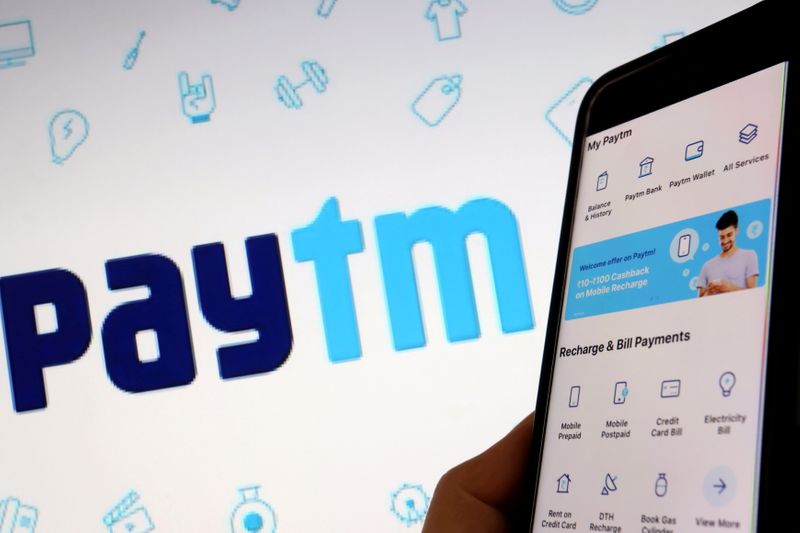© Reuters
Investing.com– Shares of Paytm, one of India’s largest payment firms, fell sharply on Friday to hit the lower-end circuit breakers after the Reserve Bank of India slapped strict restrictions on the firm’s Payments Bank unit.
Paytm (NS:), which is listed under its parent company One 97 Communications , slid 20% to 487 rupees- hitting the lower circuit breaker for a second straight session, after the RBI’s move earlier this week. The stock was at its lowest level since December 2022, and trading just a hair above lifetime lows.
Thursday and Friday’s rout wiped out about $2 billion from Paytm’s market valuation. In contrast, the index surged over 1% on Friday.
The RBI said on Wednesday that starting from February 29, the Payments Bank unit can no longer accept new deposits in its accounts or wallet services, the latter of which are a key aspect of Paytm’s business. The unit will also be unable to offer credit services or allow fund transfers, with the RBI citing “persistent non-compliances” as the reason behind the new restrictions.
The Payments Bank unit allows Paytm customers to deposit up to 200,000 Indian rupees ($2,400), which are held either in accounts or Paytm’s wallet services. Paytm has about 330 million wallet accounts, which make up a key part of the firm’s services.
Paytm said it will take steps to immediately comply with the RBI mandate, and that it expects a worst-case impact of 3 billion to 5 billion rupees on its annual earnings before interest, tax, depreciation and amortization. The firm also clarified that customer deposits will not be affected by the new curbs, and that it will seek partnerships with third-party banks to ensure no disruptions to services.
CEO Vijay Shekhar Sharma said in a social media post that the application will keep working beyond Feb 29 “as usual.”
But analysts said the impact of the new restrictions could be much deeper, especially if public trust in Paytm is dented by the RBI curbs. The firm will also face difficulty in finding new banking partners due to its regulatory woes.
Paytm was launched over a decade ago, but rose to popularity in 2016 after the Indian government overhauled the country’s currency notes, which necessitated the use of digital payments.
The COVID-19 pandemic also spurred an increase in contactless payments, which benefited Paytm.
But the firm- which went public in 2021, has struggled with profitability amid slim margins and tough competition from Walmart Inc(NYSE:)-backed PhonePe and Alphabet Inc’s (NASDAQ:) Gpay, which offer similar services.
Paytm is backed by Japan’s SoftBank Group Corp. (TYO:) and Alibaba (NYSE:) Group’s (HK:) sister firm Ant Financial Group.
